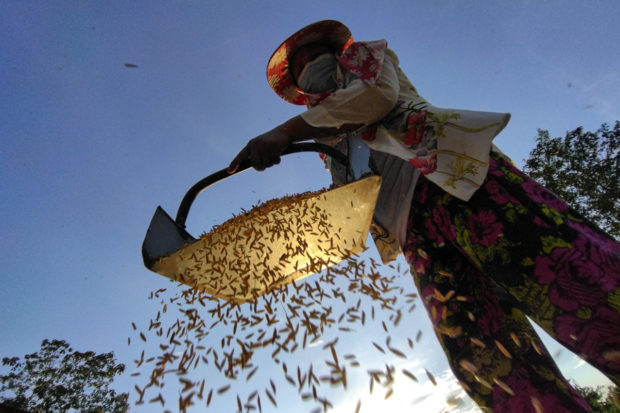Reject or defer decision on RCEP, over 70 agri groups urge Senate

PRECIOUS GRAINS Farmer Irene Soriben uses a “saki” (rice shovel) to collect sundried palay (unhusked rice) at a rice drying facility in the village of Kita-Kita in Balungao, Pangasinan. —RICHARD BALONGLONG / FILE PHOTO
MANILA, Philippines — More than 70 groups and individuals from various sectors appealed to the Senate to reject or defer its decision on the Regional Comprehensive Economic Partnership (RCEP) trade agreement, saying the upper chamber and the public were fed with “false promises”.
In an open letter signed by representatives of farmers, fishers, workers, civil society organizations, and private sector, they said that the Senate and the public “have been fed with false promises, bloated projections and misleading claims regarding the benefits of RCEP.”
The open letter was signed by Federation of Free Farmers national manager Raul Montemayor on behalf of the 73 groups and individuals listed as signatories opposing the Philippine bid to join the world’s largest trade bloc.
RCEP aims to “achieve a modern, comprehensive, high-quality, and mutually beneficial economic partnership agreement” among Association of Southeast Asian Nation (Asean) member states and their free trade partners.
But the coalition claimed that proponents of the trade accord have “conveniently downplayed, if not deliberately concealed, one crucial caveat about the agreement — that any tariff concession from our trading partners under RCEP will not be exclusive to the Philippines, and will actually be available to all other member countries,” the coalition said.
“There is therefore no assurance, and only a small chance, that we can take advantage of these trade opportunities inasmuch as other RCEP countries are way ahead of us in terms of competitiveness, efficiency and dependability,” they further stated.
Potential damage?
The groups also said that there has been a “conscious effort to belittle the potential damage of RCEP” particularly on the agriculture sector in the country.
“To cite a few: Almost all our tariffs on fishery, dairy, cacao and tobacco products will drop to zero on the very first year of RCEP. Import duties on high fructose corn syrup and other substitutes to our cane sugar will also be eliminated,” the groups said.
“Our farmers in the Cordilleras and other areas will face a deluge of cheap vegetables from China. All this, with our local producers left with little or no protection because of stringent RCEP rules on the use of additional tariff safeguards during import surges,” they added.
Due to these, the groups urged senators to be “skeptical” about the “rosy projections” concerning the benefits of RCEP, saying the calculations are based on “unrealistic assumptions and have historically been grossly off the mark.”
“The Senate has been warned that ‘we will miss the [RCEP] bus’ if we don’t join now. This is again patently misleading,” the groups said.
“In the first place, are we sure the bus will not run over us? Where is that bus going, and is that where we want to go? And is the RCEP bus the best vehicle to bring us to our desired destination?” they added.
Trade Secretary Ramon Lopez earlier said that RCEP would play a role in boosting equitable economic growth, including micro, small and medium enterprises, through the expansion of regional trade, services and investments linkages.
He said the benefits brought by RCEP to the country “far outweigh the cost of not joining.”
However, the groups said that there are still too many unanswered questions, claims that require validation, and preparations that need to be undertaken regarding RCEP.
“Many of our stakeholders and economic sectors have not been properly consulted, are simply unprepared, and are lacking in understanding of RCEP; much less, its impact,” the groups said.
President Rodrigo Duterte ratified RCEP in September 2021. It is currently in the Senate for deliberation and its concurrence.